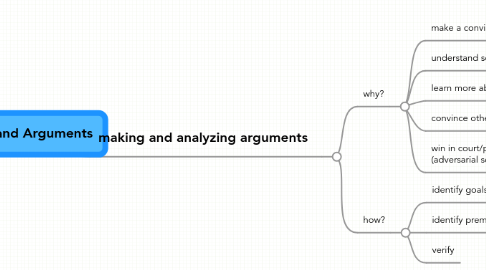
1. arguments
1.1. mathematical proofs
1.1.1. definition
1.1.2. axiom
1.1.3. theorem
1.1.4. proof
1.1.5. discussion
1.2. scientific papers
1.2.1. definition
1.2.2. hypothesis (often based on mathematical or logical analysis)
1.2.3. experimental observation
1.2.4. analysis and conclusions
1.3. philosophical dialectics
1.3.1. dialectics = of, pertaining to, or of the nature of logical argumentation.
1.3.2. resolution of disagreement, search for truth through rational discussion
1.3.3. tension between opposing forces, thesis, antithesis
1.3.4. can be an internal dialog, or a simulated dialog in a text
1.3.5. steps
1.3.5.1. state question / hypothesis
1.3.5.2. identify objections
1.3.5.3. present arguments in favor
1.3.5.4. weighing the evidence
1.3.5.5. replies to objections
1.3.6. since the 19th century, the term has been applied to increasingly odd philosophical ideas and ideologies
1.4. philosophy and other arguments
1.4.1. definitions
1.4.1.1. what terms are being used and what do they mean?
1.4.1.2. what (experimental?) procedure to you use to determine whether objects conform to definitions?
1.4.1.3. are there explicit definitions?
1.4.1.4. do differences in definitions lead to conclusions?
1.4.2. premises
1.4.2.1. valid / invalid
1.4.2.2. assumptions / observations
1.4.2.3. preferences / values
1.4.2.4. sources / conclusions of other arguments
1.4.3. reasoning
1.4.3.1. kinds
1.4.3.1.1. logical
1.4.3.1.2. statistical
1.4.3.1.3. fuzzy
1.4.3.2. classical distiction
1.4.3.2.1. deductive
1.4.3.2.2. inductive
1.4.4. conclusions
1.4.4.1. should be explicitly stated
1.4.4.2. should be supported by reasoning
1.4.4.3. in papers, are often followed by a discussion ("what does this mean?")
2. rhetoric
2.1. rhetoric = effective persuasion
2.2. logic = correct inference
2.3. rhetoric, not logic, key part of politics
2.4. good science / philosophy
2.4.1. factual correctness
2.4.2. derivation using logic
2.4.3. presentation using rhetoric
2.5. bad science / philosophy
2.5.1. persuades you to believe in false facts or inferences through rhetoric
2.6. tedious science / philosophy
2.6.1. factually and logically correct
2.6.2. bad rhetoric
2.7. in looking at philosophical arguments on AI, watch out for good rhetoric combined with bad logic
3. representations
3.1. graphical representations
3.1.1. Classical logical diagrams
3.1.2. graphs
3.1.3. tree structures & mind maps
3.1.4. build a mindmap while reading
3.2. textual structures
3.2.1. organization of an argument
3.2.2. paragraph structure
3.2.3. sections & subsections
3.2.4. Structure of Scientific papers
3.2.5. spoken arguments and rhetoric
4. making and analyzing arguments
4.1. why?
4.1.1. make a convincing argument
4.1.2. understand someone else's argument
4.1.3. learn more about a subject
4.1.4. convince other people to do something
4.1.5. win in court/politics/business (adversarial setting)
4.2. how?
4.2.1. identify goals and motivation
4.2.2. identify premises, reasoning, conclusions
4.2.3. verify
